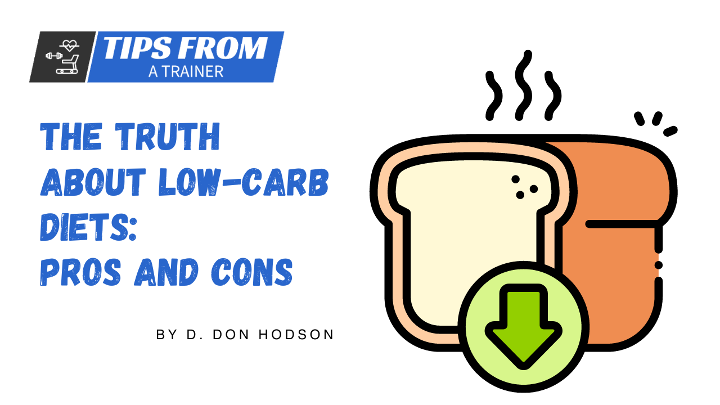Introduction
Low-carb diets have gained significant popularity in recent years, with many individuals turning to these dietary approaches for weight loss, improved health, and increased energy levels. The concept behind low-carb diets revolves around reducing carbohydrate intake and increasing the consumption of protein and fats. However, before diving into the pros and cons of low-carb diets, it's essential to understand carbohydrates and their role in the body.
Carbohydrates are one of the three macronutrients, along with proteins and fats, that provide the body with energy. They are found in various foods, including grains, legumes, fruits, vegetables, and dairy products. Carbohydrates can be classified into two main categories: simple carbohydrates and complex carbohydrates.
Simple carbohydrates, also known as sugars, are composed of one or two sugar molecules. They are quickly digested and absorbed, leading to a rapid increase in blood sugar levels. Examples of simple carbohydrates include table sugar, honey, and processed foods high in added sugars.
On the other hand, complex carbohydrates are made up of multiple sugar molecules arranged in a complex structure. They are typically found in whole grains, starchy vegetables, and legumes. Complex carbohydrates take longer to digest, providing a more gradual release of glucose into the bloodstream.
Table of Contents
Introduction
Understanding Carbohydrates
The Pros of Low-Carb Diets
Weight Loss and Improved Body Composition
Improved Blood Sugar Control and Insulin Sensitivity
The Cons of Low-Carb Diets
Nutrient Deficiencies
Sustainability and Social Challenges
Potential Side Effects of Low-Carb Diets
Initial Side Effects: "Keto Flu"
Reduced Exercise Performance
Personalization and Considerations for Low-Carb Diets
Individual Variability and Personalization
Considerations and Precautions
Conclusion

Understanding Carbohydrates
Carbohydrates play a crucial role in the body as they are the primary source of energy for the brain and muscles. When consumed, carbohydrates are broken down into glucose, which can be used immediately for energy or stored in the liver and muscles as glycogen for later use.
The body has a sophisticated system for regulating blood sugar levels. When carbohydrates are ingested, the pancreas releases insulin, a hormone that helps transport glucose from the bloodstream into the cells. This process ensures that cells receive the necessary energy to function optimally.
In addition to providing energy, carbohydrates also contribute to other vital functions in the body. They are necessary for the synthesis of certain amino acids, which are the building blocks of proteins. Carbohydrates also play a role in supporting the health of the digestive system by providing dietary fiber, which aids in digestion and promotes bowel regularity.
It's important to note that not all carbohydrates are created equal in terms of their impact on health. Foods high in refined carbohydrates, such as sugary drinks, white bread, and pastries, are often low in nutrients and can lead to rapid spikes in blood sugar levels. On the other hand, foods rich in complex carbohydrates, such as whole grains, fruits, and vegetables, provide a more sustained release of energy and are typically accompanied by valuable vitamins, minerals, and fiber.
Understanding the different types of carbohydrates and their effects on the body lays the foundation for examining the pros and cons of low-carb diets. By delving deeper into the subject, we can gain a comprehensive understanding of the potential benefits and drawbacks associated with reducing carbohydrate intake.
The Pros of Low-Carb Diets
Weight Loss and Improved Body Composition
One of the main reasons people turn to low-carb diets is for weight loss and improved body composition. When you reduce your carbohydrate intake, your body enters a state called ketosis, where it starts using stored fat as a primary source of fuel. This can lead to a significant reduction in body weight and body fat percentage, especially during the initial stages of the diet.
Low-carb diets have been shown to be effective for short-term weight loss, and they may provide an advantage in terms of preserving lean muscle mass compared to other restrictive diets. By focusing on protein-rich foods and healthy fats, low-carb diets can help control hunger and promote a feeling of fullness, which can lead to reduced calorie intake and better adherence to the diet.
Furthermore, reducing carbohydrate intake can lead to a decrease in water retention, which may result in noticeable weight loss in the first few days or weeks of following a low-carb diet. This initial drop in weight can be motivating and provide individuals with the confidence and encouragement to continue their weight loss journey.
Improved Blood Sugar Control and Insulin Sensitivity
Another potential benefit of low-carb diets is improved blood sugar control and insulin sensitivity. When you consume fewer carbohydrates, there is less need for insulin production and secretion, which can be beneficial for individuals with insulin resistance or diabetes.
Low-carb diets have been shown to reduce fasting blood sugar levels and improve insulin sensitivity in people with type 2 diabetes. By limiting the intake of carbohydrates, the body is less likely to experience drastic spikes in blood sugar levels, leading to more stable energy levels throughout the day.
In addition, low-carb diets may help regulate appetite and cravings, which can be particularly beneficial for individuals with a tendency to overeat or struggle with sugar addiction. By minimizing the consumption of high-carbohydrate foods, people may experience reduced cravings and a more balanced appetite, which can support better blood sugar control and overall metabolic health.
The Cons of Low-Carb Diets
Nutrient Deficiencies
One potential drawback of low-carb diets is the risk of nutrient deficiencies, particularly if the diet is not well-planned and lacks a variety of nutrient-rich foods. Carbohydrates are a major source of essential vitamins, minerals, and dietary fiber in the diet. By significantly restricting carbohydrate intake, it can be challenging to meet the recommended daily intake of certain nutrients.
For example, many fruits, vegetables, and whole grains are excellent sources of vitamins C, E, and various B vitamins. These nutrients play critical roles in supporting immune function, energy production, and overall health. By eliminating or severely limiting these foods, there is a risk of inadequate intake of these essential nutrients.
Additionally, low-carb diets may be lower in dietary fiber, which is crucial for digestive health, maintaining a healthy weight, and reducing the risk of chronic diseases such as heart disease and certain types of cancer. It's essential for individuals following a low-carb diet to prioritize fiber-rich foods such as non-starchy vegetables, nuts, and seeds to ensure adequate fiber intake.
Sustainability and Social Challenges
Another challenge of low-carb diets is their long-term sustainability and potential social implications. Restricting carbohydrate intake can be challenging for some individuals, as many common foods and social occasions revolve around carbohydrate-rich choices. This can lead to feelings of deprivation and make it difficult to maintain the diet over the long term.
Moreover, low-carb diets may require careful meal planning and preparation, which can be time-consuming and inconvenient for individuals with busy lifestyles. The limited food choices and the need to avoid certain high-carb foods may also lead to a sense of monotony in the diet, making it less enjoyable and sustainable in the long run.
Furthermore, social situations can pose challenges for individuals following low-carb diets. Attending parties, eating out at restaurants, or family gatherings may require navigating menu options or explaining dietary restrictions, which can be socially uncomfortable for some individuals.
Potential Side Effects of Low-Carb Diets
Initial Side Effects: "Keto Flu"
One of the commonly reported side effects of low-carb diets, especially during the initial stages, is the so-called "keto flu." As the body adjusts to using ketones as its primary source of fuel instead of carbohydrates, some individuals may experience symptoms such as fatigue, headache, dizziness, irritability, and brain fog. These symptoms are often temporary and subside as the body adapts to the dietary changes.
To minimize the discomfort associated with the keto flu, it's important to stay well-hydrated, ensure adequate electrolyte intake, and gradually reduce carbohydrate intake rather than making sudden drastic changes. Increasing sodium, potassium, and magnesium-rich foods in the diet, or even considering electrolyte supplementation, can help alleviate these symptoms.
Reduced Exercise Performance
Low-carb diets, especially those very low in carbohydrates, may impact exercise performance, particularly for activities requiring high-intensity or prolonged endurance. Carbohydrates are the body's preferred source of energy during intense physical activities, as they are rapidly converted into glucose and stored in the muscles as glycogen.
When carbohydrate stores are depleted, individuals following a low-carb diet may experience decreased stamina, reduced strength, and diminished overall performance during intense workouts or endurance exercises. This can be especially relevant for athletes or individuals engaged in activities that demand high energy expenditure.
However, it's important to note that the body can adapt to using fat as a fuel source more efficiently over time, and some individuals on low-carb diets report improved performance once they become fully fat-adapted. Nevertheless, it's advisable for athletes or those with specific performance goals to work closely with a sports nutritionist or dietitian to optimize their carbohydrate intake and fueling strategies.
Personalization and Considerations for Low-Carb Diets
Individual Variability and Personalization
Like any dietary approach, the effectiveness and suitability of low-carb diets can vary among individuals. Some people may thrive on a low-carb eating plan and experience significant benefits, while others may not respond as favorably. It's crucial to recognize that individual variability plays a significant role in how our bodies respond to different macronutrient compositions.
Factors such as metabolic health, activity levels, body composition, genetics, and personal preferences all influence how our bodies process and utilize carbohydrates. Therefore, it's essential to consider personalized approaches when adopting a low-carb diet. Working with a qualified healthcare professional, such as a registered dietitian, can help tailor the diet to individual needs, optimize nutrient intake, and ensure long-term sustainability.
Considerations and Precautions
Before embarking on a low-carb diet, certain considerations and precautions should be taken into account. It's essential to ensure the diet is well-balanced, incorporating a variety of nutrient-dense foods to minimize the risk of nutrient deficiencies. Including ample non-starchy vegetables, lean proteins, healthy fats, and adequate fiber sources can help address these concerns.
Individuals with pre-existing medical conditions, such as diabetes, cardiovascular disease, or kidney problems, should consult with their healthcare provider before making significant dietary changes. Close monitoring of blood sugar levels, medication adjustments, or regular check-ins may be necessary to ensure optimal health and safety.
Furthermore, it's important to adopt a sustainable and flexible approach to low-carb diets. Instead of viewing it as a short-term solution, focusing on long-term lifestyle changes and establishing healthy eating patterns is key. Gradually reintroducing carbohydrates in a controlled manner, particularly from whole food sources, may be beneficial for some individuals to maintain a balanced and enjoyable diet.
Conclusion
In conclusion, low-carb diets can have both pros and cons depending on individual circumstances and goals. The potential benefits include weight loss, improved blood sugar control, and reduced hunger levels. On the other hand, potential drawbacks may include nutrient deficiencies, initial side effects, and challenges with long-term sustainability.
It's important to emphasize that there is no one-size-fits-all approach when it comes to nutrition. What works well for one person may not work for another. Personalization is key in finding the right dietary approach that aligns with individual needs, preferences, and health considerations.
For individuals considering a low-carb diet, it is advisable to seek guidance from a qualified healthcare professional or registered dietitian. They can help assess individual needs, provide personalized recommendations, and ensure the diet is nutritionally balanced and sustainable.
Furthermore, it's important to remember that carbohydrates are not inherently bad. They are a vital macronutrient that provides energy and important nutrients to the body. Instead of completely eliminating carbohydrates, it may be beneficial to focus on the quality and type of carbohydrates consumed. Choosing whole, unprocessed sources like fruits, vegetables, whole grains, and legumes can provide a range of essential nutrients and dietary fiber.
Finally, adopting a balanced and holistic approach to nutrition is crucial for long-term health and well-being. This includes considering other lifestyle factors such as regular physical activity, stress management, and adequate sleep.
In summary, low-carb diets can be an effective tool for some individuals to achieve certain health goals. However, careful consideration should be given to personalization, nutritional adequacy, and long-term sustainability. Consulting with a healthcare professional can provide valuable guidance and support in navigating the potential benefits and drawbacks of low-carb diets.
By understanding the science and evidence behind low-carb diets and considering individual factors, individuals can make informed decisions about their dietary choices and find an approach that best suits their needs and promotes overall health and well-being.

Don Hodson, Certified Personal Trainer
I'm Don, an ACE-certified personal trainer and the founder of Tips From A Trainer. With my passion for fitness and years of experience, I've helped countless individuals transform their physiques!
Having personally overcome weight challenges throughout my life, I understand the struggle. Through consistency, exercise, and a balanced diet, I have managed to stay in shape and I want to share my message with the world!
The fitness industry is fraught with misconceptions and deceptive practices, which is why I am committed to providing you with the truth.
- My Site: www.Don-Hodson.com
- My Company: www.ConnectedAgeMarketing.com

The Truth About Low-Carb Diets